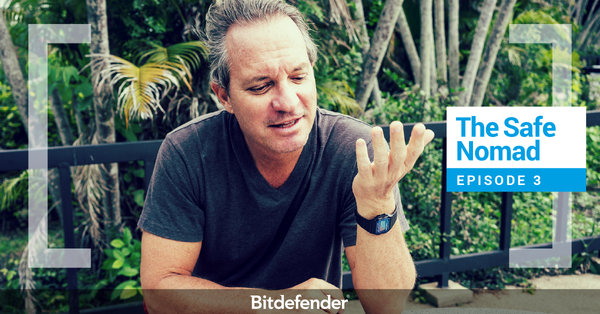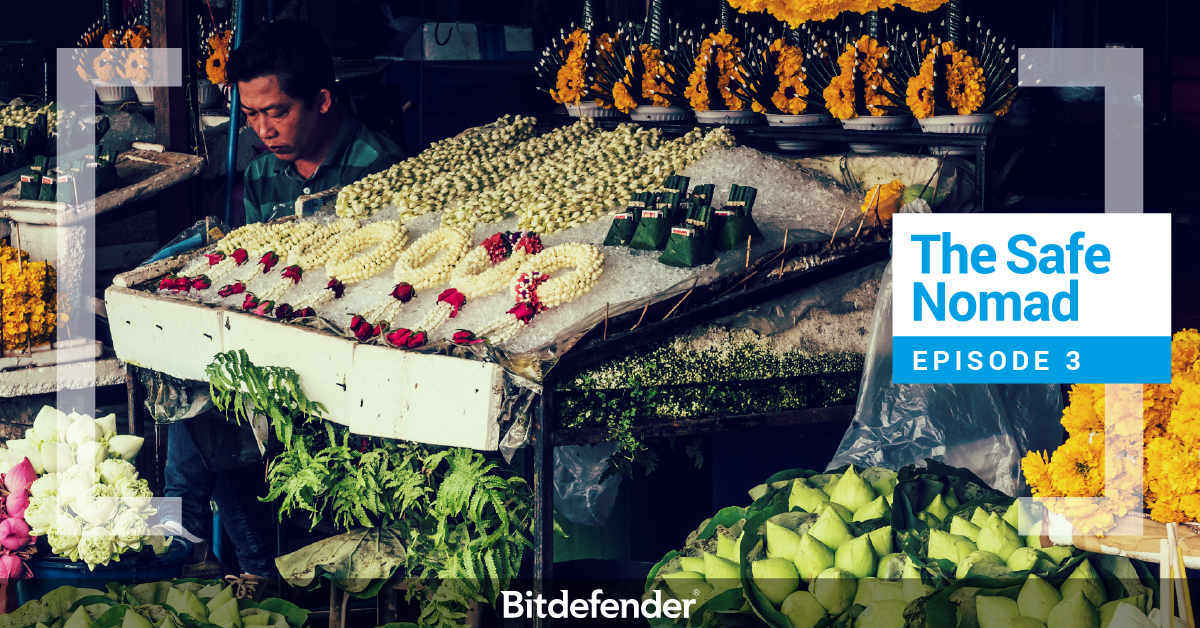The Safe Nomad (3). Oliver Benjamin, US: "Digital nomadism is about combining everything in your life into one liberated and mobile package."

Back in the early nineties, the sight of a person carrying a portable computer on trains, buses and airplanes and working remotely from public libraries, cafes or pool bars across the world was as uncommon as that of an elephant on the streets of New York nowadays, If not more so.
And yet, 1992 saw Oliver Benjamin, a long-haired and bearded young man from California, landing in Bangkok, Thailand, with a bagful of books on his back, a 10 lbs. laptop in his shoulder bag and a dream: to write his own first novel.
25 years later, we find Oliver 700 kilometers north of his first landing, in the picturesque city of Chiang Mai, the unofficial capital of digital nomadism in South East Asia. His hair is shorter, his beard is gone, but the Oliver who wanted to become a novelist became something of a novelty.
“Soon after graduating the UCLA (University of California, Los Angeles), I realized I had to find a way not to get stuck in the life I was seeing all around me in that huge, congested and busy city. I had to find a way to work freely, in a place where my mind could operate more efficiently. After I started traveling, I got addicted to it immediately. Traveling is a way of simplifying one”s life, in finding a dedicated manner in which to do nothing—and by extension, to do everything.”
The proto-digital nomad
Oliver was lucky. In the 90s, the tech industry was booming and the need for his services as a professional graphic designer were in high demand. It was easy for Oliver to get the jobs: he already knew how to use computer design programs, whereas most designers back then still used the paste-up technique. So Oliver could travel the world and still make some decent money while doing so.
The internet was still in its childhood back then—inconceivably slow by today”s standards and internet cafes were few and far between. A typical user could not transfer big Photoshop files, so most of Oliver”s projects were logos and advertising copy for marketing materials. He bought his first portable computer in 1992.
“As far as I knew I was the only person carrying a laptop around in those days. In a way, I was a proto-digital nomad. Ultimately, I was unable to publish the novel. However, in trying to become a novelist, I developed some writing skills that led to a reasonably successful writing career as a travel writer. And that allowed me to continue living the dream, namely living in one of those stock photos where one is sitting half naked on the beach with a computer and a cocktail.”
Discovering The Dude
Many people nowadays follow some sort of a spiritual quest. Some go on pilgrimages, some practice yoga or meditation; some choose to spend time in monasteries or temples. Oliver, too, tried all that but none of it really jibed with his rationalist inclinations, so after years of studying various spiritual paths he created Dudeism, a deep yet lighthearted “open-source religion” inspired by Coen Brothers” iconic film The Big Lebowski.
“Essentially, Dudeism is a method, a technique for finding a way to avoid being coerced into doing things you don”t want to do. Like traveling was for me back in the 90s, it”s an easy way to simplify your life.”
About digital nomadism
“I am not surprised about how big the digital nomad culture has grown in the last few years. To be honest, I am surprised that there aren”t more people doing it. There are a lot of potential ways to make a little income and live in a place like Chiang Mai, for example.‘
“Life is so short and there are so many things to learn, ways to improve yourself and make sense of your life. It”s not just about making lots of money and partying on the beach every night. Being a digital nomad opens up a whole world to you: you can write songs, write books, study martial arts, learn various skills and so on. You can learn and earn money and grow as a person in a way that is hard to accomplish when you”re working in a cubicle and stuck in traffic. And though the majority of the digital nomads seem drawn to drop shipping, there are so many ways to make a living on the internet. Being a digital nomad is so much more than being a professional backpacker. Most importantly, you”re free and self-sufficient. Most backpackers are just on extended holidays, not actually living a sustainable lifestyle. The way I see it, digital nomadism is about combining everything in your life into one liberated and mobile package, one which produces as well as consumes.”
On how technology can change our lives
“The internet allows us to work together, exchange ideas and value, without having to share the same physical environment. One can live in a place that is psychologically appropriate for that person – a beach or the middle of the jungle – and still do one”s work. To be honest, I don”t understand why so many people keep living inside cities. The great promise of the internet was that we would move to the countryside, have solar panels and Wi-Fi and never again have to lose our will to live while stuck in traffic.”
Can the modern man be free without technology?
“That”s a very good question. We think of technology in terms of computers and phones, but technology also means fire and steel and agriculture. Every great technological advancement has both freed us and enslaved us. That”s the big challenge for humans: to find the balance between these two outcomes of technology.”
What gives you the feeling of security while being so far from home and travel so much?
“Technology again, I would say. The free exchange of information that the Internet facilitates have made life more secure. After all, the greatest insecurity comes from not knowing. When you don”t know what to do, you go into a panic. Having the internet at your fingertips means that no matter where you are you can find answers. GPS is one obvious example: you download an offline map and you”ll never be lost again. Also, getting in touch with other people has never been easier. One very frequent plot point of old horror or thriller movies was the missed call. But there are no missed calls anymore. You can always get in touch with your wife to warn her that the monster is coming. The greatest security in the world comes from being hyper-connected. ”
“This sort of raises a point about freedom. As much as we like to romanticize freedom, unfettered freedom leads to dissolution. The problem with placing too much trust in freedom is that it opens the door to chaos. Though a traveler or a spiritualist might celebrate freedom above all else, at the end of the day, it is structures like technology and societal conventions that allow those freedoms to occur. You can”t be free if you”re lost, or dead. So then, security must be about finding the ideal balance between structure and freedom. Finding that balance is the key to keeping the world both dynamic, and at the same time secure enough to protect that dynamic.“

tags
Author
From his base in Thailand Brad journeys around the world – from Papua to the Carribean – seeking for deep, meaningful stories about humanity, nature and life.
View all postsRight now Top posts
How to Protect Your WhatsApp from Hackers and Scammers – 8 Key Settings and Best Practices
April 03, 2025
Outpacing Cyberthreats: Bitdefender Together with Scuderia Ferrari HP in 2025
March 12, 2025
Streamjacking Scams On YouTube Leverage CS2 Pro Player Championships to Defraud Gamers
February 20, 2025
How to Identify and Protect Yourself from Gaming Laptop Scams
February 11, 2025
FOLLOW US ON SOCIAL MEDIA
You might also like
Bookmarks













